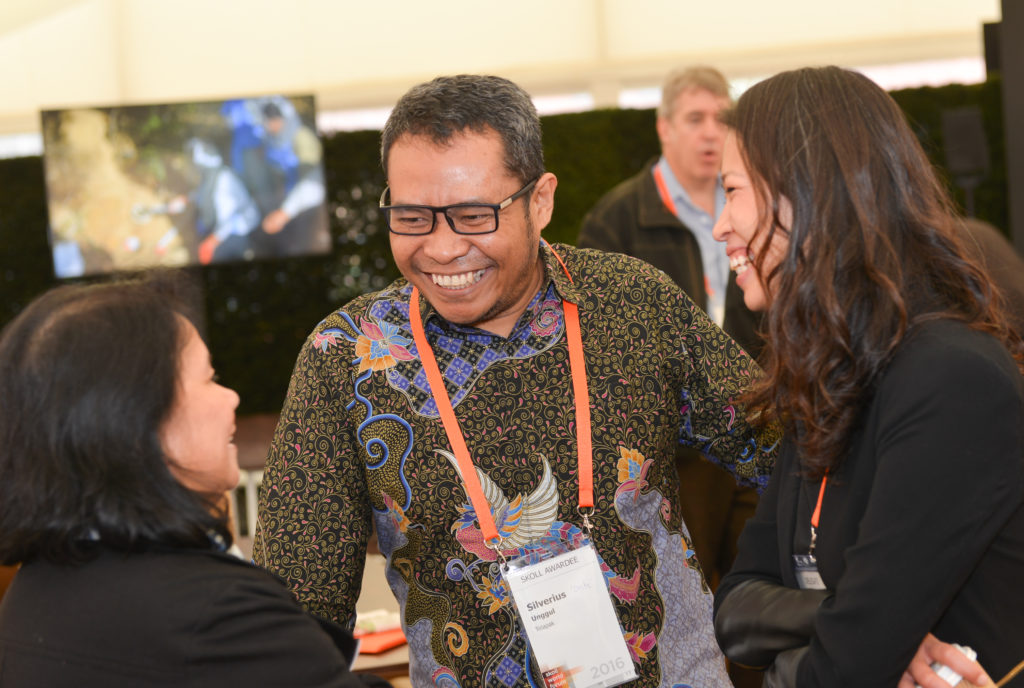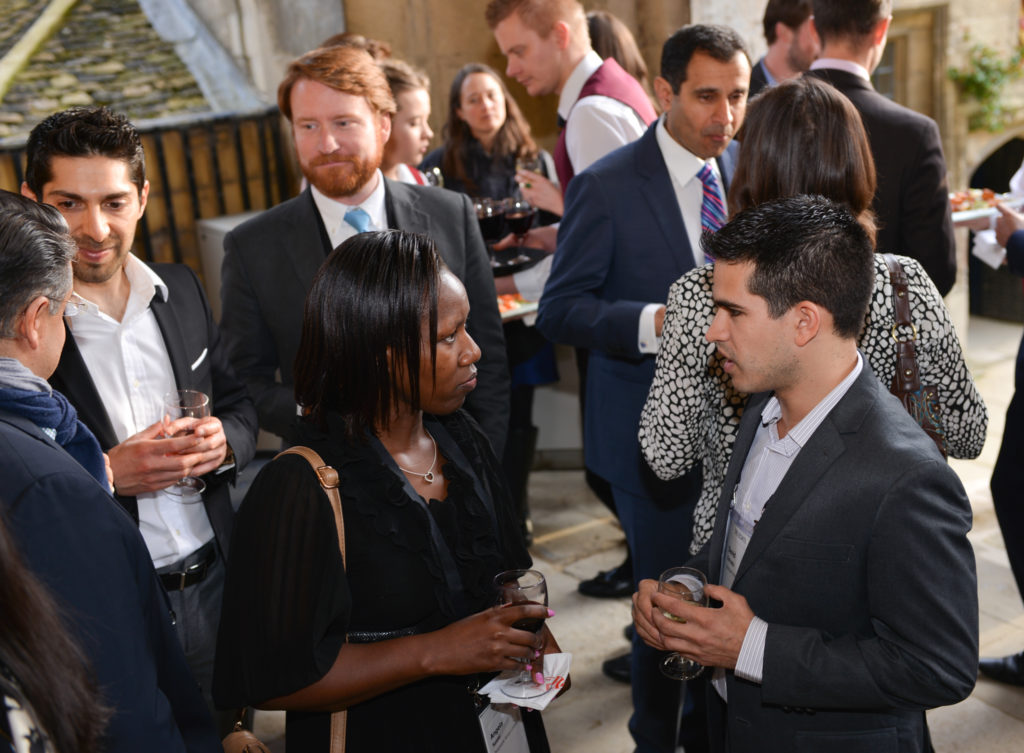Skoll World Forum delegates often talk about the “magic” that happens in Oxford; an ineffable quality turns a gathering of some thousand people into an experience of unquantifiable value. We’ve explored programming and planning in previous posts here, and this time we’ll focus on you, our community of delegates. That “magic” isn’t so mysterious after all, it’s the result of very deliberately assembling the right mixture of people in the right place so that serendipitous connections can be made that push social progress and equilibrium change. Here’s the secret: serendipity is ever so lightly orchestrated.
“Many, many conversations—some curated, some as a result of seeded serendipity—have led to explorations of mutual interest, then funding partnerships,” said Edwin Ou, Skoll’s Director of Funder Alliances. “Many Skoll Awardees over the years—including Blue Ventures, Camfed, Crisis Action, Landesa, One Acre Fund, OneSky, Root Capital, USAID, Water for People, WSUP, etc.—have connected with aligned funders—including Citi, Ford, Fossil, Gates, Hilton, Jasmine, MasterCard, Mulago and The World We Want Foundation, alongside many others—leading to powerful partnerships to advance large-scale impact.”
I sat down recently with Claire Wathen, Skoll’s Community Manager, to get a better sense of how she and the Forum team approach the task of getting the right balance of folks into those beautiful 500-year old buildings, to maximize “the magic”.
Zach Slobig: You’re at a dinner party and someone asks you to describe a Skoll World Forum delegate. What’s your response?
Claire Wathen: Ah, my favorite dinner party question! Delegates are senior leaders from around the world who drive social change within their organization, sector, and broader ecosystem. They could be filmmakers who work with nonprofits to share their impact through storytelling, or corporate leaders developing sustainable supply chains, social entrepreneurs scaling operations to new markets, or strategy consultants bridging philanthropies to collaborate in new ways. Regardless of their role, Forum delegates are active participants in the Skoll community who share an optimistic mindset: we can solve our world’s pressing problems.

Zach: I understand that if you look at the entire community of delegates, you’ll find that it roughly divides into thirds: social entrepreneurs, funders, and partners. Why is that a good rule of thumb?
Claire: Our delegate invitation process begins with social entrepreneurs. Ultimately, we host the Forum to highlight and accelerate entrepreneurial solutions and partnerships. To support Skoll Awardees and other social entrepreneurs, we invite funders and partner organizations from government, media, financial services, corporations, social enterprise, and philanthropy.
Beyond these broad distinctions, I curate a mixture of geographies, issue area expertise, new vs. returning delegate counts, and organizational representation. Given the span of organization size and impact within our global community, there is an art and science to achieving our representation goals. And while many factors are beyond our control, like whether invited delegates are able to travel to Oxford in April, we consistently receive a well-rounded community of senior leaders.
Zach: And it’s always been by invitation only. How has Skoll moved to make that process more transparent?
Claire: Yes, we continue to believe that invitations allow us to gather the senior leadership participants critical to driving change. Following the 2016 Forum, we analyzed our entire network of contacts to understand how the delegate community has evolved over the past 13 years. This drove our 2017 Forum curation strategy to increase representation from the global south as well as government and corporate sectors. We’ve become more transparent in communicating through dev.skoll.org about what delegate sectors we are looking to increase. We have also evolved our new delegate application process, which resulted in more than 100 invitations this year.
Beyond transparency, we have begun to collaborate more with referral partners. We are excited to continue expanding ways the African Leadership Network, Aspen Institute, TED, Opportunity Collaboration, and others bring their network leaders to the Forum in order to engage with our community in new ways year-round.

Zach: What’s your favorite “seeded serendipity” story?
Claire: Well there are so many, really. At the Skoll World Forum in 2012, One Acre Fund secured a three-year grant. After impromptu meetings in Oxford in 2016, Upaya Social Ventures secured a grant from the Peery Foundation, and found a site sponsor for its first accelerator program in India. Citigroup gave a $2 million working capital line of credit for Skoll Awardee KickStart International and funded programs like the launch of Skoll Awardee Kiva’s Kiva U program.
One of my favorite aspects of the Forum is the Emerging Leaders Initiative, a partnership with the Mastercard Foundation. Now in its fourth year, the program brings 10-12 next generation leaders to the Forum and addresses a wide range of issues like energy access in sub-Saharan Africa and the links between corruption and natural resource exploitation.
We receive amazing feedback about the impact of the Forum on the leaders’ personal and professional development.
Zach: The community grows every year, as does the field of social entrepreneurship. How do you ensure that you’re both cultivating a rich community that’s reflective of that growth and evolution?
Claire: It’s certainly a challenge to balance the growth of our community and the broader field, with our fixed capacity for the Skoll World Forum. As our Director Sarah Borgman puts it, we’re creating a larger tent through the new format of Skoll Week in Oxford. We hope this platform will support the ever-growing social progress field while maintaining the carefully curated community senior-level delegates. We are excited to continue developing avenues to democratize the conversation through bottom-up programming.
Connect with the 2017 Skoll World Forum delegate community here.